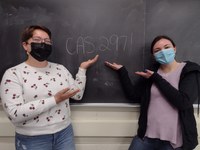The Penn State Speech and Debate Team, is open to all current undergraduate students at the University Park campus. If you are interested in joining, please come to one of weekly meetings, held every Tuesday and Thursday at 3:05 p.m. in 113 Thomas Building.
There is no fee to join, and all travel expenses are covered by the Department of Communication Arts and Sciences while competing with the team. Each member sets their own level of commitment; some students only participate in public debates while others only compete at tournaments.
Open Practice
Practices provide opportunities for Penn State students to hone their persuasive speaking skills. All Penn State students are welcome to attend and participate in the team’s practices.
At each practice, the team holds lectures and practice rounds. Students are invited to participate, to speak from the audience, or to help judge. Coaches Tim Michaels and Courtney Wright take turns running the open practice. They provide argument training and speaking advice to those who participate.
Public Debate
Every semester, the Penn State Speech and Debate team holds one to three public debates. These events provide opportunities for dedicated members of the Speech and Debate team to display the skills that they have been working on in front of a larger, public audience. At these debates, audience members have the ability to give speeches and question the points made by the debaters. Past debates have covered topics such as natural gas fracking, nuclear energy usage, the university’s undergraduate curriculum, and various economic issues. The purpose of these public debates is to deliberate thoughtfully on the topic at hand and to educate both the participants and the audience.
The Speech and Debate team regularly invites other schools to participate in these events. The team annually hosts the British National Debate Team and maintains a cooperative relationship with other universities from the Mid-Atlantic region to attend these debates.
Competition
The Penn State Speech and Debate team participates in a variety of competition formats. For debate, students compete in Lincoln-Douglas debate. Lincoln-Douglas debate is a one-on-one format under the purview of the National Forensic Association (NFA).
Students also compete in individual speech events (IE’s). These events include limited preparation events (extemporaneous and impromptu speaking), public address events (e.g. persuasive speaking), and oral interpretation events (e.g. Dramatic Interpretation). IE’s are housed under the National Forensic Association. At the end of the year, qualifying students have the opportunity to compete at the national NFA tournament in April.
Members of the team are expected to share the skills that they learn in competition with their fellow team members at open practices. Intercollegiate competition not only provides an outlet for dedicated members of the Speech and Debate team to practice their skills, but it also allows the team to generate ideas and learn from other competitors across the country.
History
The Penn State Debate Society was founded in the 1890s, but debate did not really take off at Penn State until the late 1910s. A women’s debate team was founded at Penn State in 1916. However, due to the first World War, the team was quickly disbanded and not reinstated until 1926. During the 1920s the group became much more popular, so much so, in fact, that 70 students tried out for the team in the fall of 1927. Of those applicants only 30 elite debaters made the cut. Around that time, the Penn State student newspaper, The Collegian, went so far as to suggest that debate become an official activity of the fraternities on campus.
During the 1920s the Penn State Debate began holding Extemporaneous Speaking Contests. Students gave speeches on a wide range of topics, including titles like “God of Science,” “These Women,” “Getting Nowhere, Rapidly,” and “The Great Sports Myth.”
In 2020, the Society split off from the team. Currently, the Speech and Debate team is faculty-run and the Society is student run.
